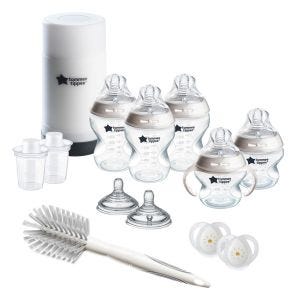
This is a demo store. No orders will be fulfilled.
Subscription orders can be cancelled at anytime. Free delivery on all subsequent subscription orders. Find out more about subscriptions.
They’re easy and fuss free
Your products are automatically sent to you
You save up to 10% when you sign up for a subscription
You can cancel at any time
Every pregnancy is different, but one common (and uncomfortable) symptom that many people experience is mild itching. If you're pregnant and find yourself scratching away, it's important to understand the reasons behind this and seek suitable remedies.
Let's guide you through the causes of itching during pregnancy and offer some practical tips to help ease the discomfort.
Although irritating, itching during pregnancy is common, especially on the bump, it can sometimes be a symptom of a liver condition called intrahepatic cholestasis of pregnancy or ICP.
If you're pregnant and experiencing itchiness, it's good to let your midwife or doctor know so they can investigate and help alleviate any discomfort.
Let's run through some of the common causes of itching during pregnancy.
Mild itching can be caused by increased blood supply to the skin during pregnancy.
People who have eczema sometimes find that it gets worse during pregnancy.
Hormonal changes during pregnancy can cause a lot of issues - from mood swings and circulation problems to itchiness.
As your baby bump grows, the skin stretches, and sometimes your oil glands can't maintain their normal moisture level. This can make the skin on your legs and tummy tight, dry, and itchy.
Intrahepatic cholestasis of pregnancy or ICP is a liver disorder that requires medical attention. It usually starts at the beginning of the first trimester (from around 28 weeks of pregnancy) but can occur earlier.
If you've has during a past pregnancy, there's an increased likelihood that it'll occur again in future pregnancies. The symptoms of ICP include:
If you're itchy and have a rash, you could have a skin condition that's known as polymorphic eruption of pregnancy or PEP.
If you think you have PEP, don't worry. While it can be unpleasant and uncomfortable, it won't harm you or your baby, and it can be treated with the help of your doctor.
We know that itchiness can be really irritating, so let's run through some ways to relieve it.
Loose-fitting clothes made from natural materials like cotton will help to air circulate, keeping you cool and preventing itching.
Avoid clothes made of synthetic materials or wool.
Check the ingredients of any skincare products you're using. Look out for strong perfumes because they can make your itching worse.
Applying fragrance-free moisturizer or lotion can calm your skin. Try putting it in the fridge to cool it before applying!
Alcohol, caffeine, and spicy foods can affect blood flow and make itching worse.
Taking cool showers can help soothe itchy skin, especially during the summer months.
Using a humidifier and/or a fan can help to keep the air in your home moist and cool which can help dry, itchy skin.
Dehydrated skin is often itchy, but drinking plenty of water will help.